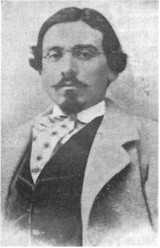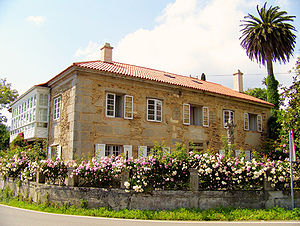
Eduardo Pondal
Encyclopedia
Eduardo María González-Pondal Abente (February 8, 1835 – March 8, 1917) was a Spanish
poet, who wrote in both Spanish
and Galician
Of Hidalgo
origin Pondal was the youngest of a family of seven. From 1884 onwards he studied Latin
in a school in Vilela de Nemiña which belonged to his cleric relative, Cristobal Lago. In 1848, he moved to Santiago de Compostela
to study Philosophy and, afterwards, Medicine at University.
As a student, he was a regularat Liceo de Santo Agostiño, a place where literary debates took place. There, he was discovered as a poet during the banquet of Conxo. It was a banquet organized by liberal students in 1856 to honor "the third state", and where students rubbed shoulders with laborers. The toasts are retrospectively considered to have an important political meaning.
In 1860, Pondal completed his studies and began working as a doctor for the Spanish Army at Ferrol. He also published A Campana de Anllóns, his first poem in the Galician language.
In 1861, he opted for an official job working for the Crown. He got the job in Asturias
, but he left it, and his career as a doctor.
He would soon retire and come back to the house of his family, where he lived with regular trips to Santiago de Compostela
and A Coruña
(Corunna), where he visited a library called a Cova Céltica, debating with Martínez Salazar, Manuel Murguía
, Florencio Vaamonde, Martelo Paumán, Urbano Lugris and others. Through Murguía, Pondal would get to know James Macpherson
's poetry, and decided to become the "bardo" (bard
) of the Galician nation, becoming the guide and interpreter of the route it would follow.
He published Rumores de los pinos in 1877, a compilation of 21 poems in Galician and Spanish, which would become the basis for Queixumes dos pinos (1886). One of the poems in Galician, "Os pinos
" (literally "The Pines") would become the lyrics for the Galician national anthem
, with music by Pascual Veiga.
Pondal considered himself a "poet of freedom", wanting to raise his people. He imagined a past of freedom and independence, which he tried to recover with his poetry, renewing History. Unfortunately, Galician-Celtic mythology was almost completely lost in those days, so Pondal had to guess and re-invent it, based on Ossian's poetry, quotations from the Leabhar Gabala and Murguia's analysis. Pondal created a fragmentary mythology, using as his archetypes o Heroe (the hero
) and o Bardo (the bard). He invented historic characters, like Ourens (trying to create a hero whose name would become the basis for the city of Ourense
). Due to the poetic nature of his epic, Pondal's mythology would never become as complete or exhaustive as J.R.R. Tolkien's.
Pondal tried to restore the Galician language in a time in which it lacked social status. Nature and women are the keys of his production. From a Linguistic
perspective, Pondal tried to mix the populistic style of the Galician of his time, with different scholarly terms in the lexicon and syntax.
He tried to write a long epic poem, Os Eoas, based on the descovery of America
, but he was never satisfied with his work and only published a first draft in 1858.
Pondal died in La Luguesa hotel in A Coruña
on 8 March 1917. He was buried in San Amaro cemetery.
The Día das Letras Galegas
was dedicated to Pondal in its third year, 1965.

Spain
Spain , officially the Kingdom of Spain languages]] under the European Charter for Regional or Minority Languages. In each of these, Spain's official name is as follows:;;;;;;), is a country and member state of the European Union located in southwestern Europe on the Iberian Peninsula...
poet, who wrote in both Spanish
Spanish language
Spanish , also known as Castilian , is a Romance language in the Ibero-Romance group that evolved from several languages and dialects in central-northern Iberia around the 9th century and gradually spread with the expansion of the Kingdom of Castile into central and southern Iberia during the...
and Galician
Galician language
Galician is a language of the Western Ibero-Romance branch, spoken in Galicia, an autonomous community located in northwestern Spain, where it is co-official with Castilian Spanish, as well as in border zones of the neighbouring territories of Asturias and Castile and León.Modern Galician and...
Of Hidalgo
Hidalgo (Spanish nobility)
A hidalgo or fidalgo is a member of the Spanish and Portuguese nobility. In popular usage it has come to mean the non-titled nobility. Hidalgos were exempt from paying taxes, but did not necessarily own real property...
origin Pondal was the youngest of a family of seven. From 1884 onwards he studied Latin
Latin
Latin is an Italic language originally spoken in Latium and Ancient Rome. It, along with most European languages, is a descendant of the ancient Proto-Indo-European language. Although it is considered a dead language, a number of scholars and members of the Christian clergy speak it fluently, and...
in a school in Vilela de Nemiña which belonged to his cleric relative, Cristobal Lago. In 1848, he moved to Santiago de Compostela
Santiago de Compostela
Santiago de Compostela is the capital of the autonomous community of Galicia, Spain.The city's Cathedral is the destination today, as it has been throughout history, of the important 9th century medieval pilgrimage route, the Way of St. James...
to study Philosophy and, afterwards, Medicine at University.
As a student, he was a regularat Liceo de Santo Agostiño, a place where literary debates took place. There, he was discovered as a poet during the banquet of Conxo. It was a banquet organized by liberal students in 1856 to honor "the third state", and where students rubbed shoulders with laborers. The toasts are retrospectively considered to have an important political meaning.
In 1860, Pondal completed his studies and began working as a doctor for the Spanish Army at Ferrol. He also published A Campana de Anllóns, his first poem in the Galician language.
In 1861, he opted for an official job working for the Crown. He got the job in Asturias
Asturias
The Principality of Asturias is an autonomous community of the Kingdom of Spain, coextensive with the former Kingdom of Asturias in the Middle Ages...
, but he left it, and his career as a doctor.
He would soon retire and come back to the house of his family, where he lived with regular trips to Santiago de Compostela
Santiago de Compostela
Santiago de Compostela is the capital of the autonomous community of Galicia, Spain.The city's Cathedral is the destination today, as it has been throughout history, of the important 9th century medieval pilgrimage route, the Way of St. James...
and A Coruña
A Coruña
A Coruña or La Coruña is a city and municipality of Galicia, Spain. It is the second-largest city in the autonomous community and seventeenth overall in the country...
(Corunna), where he visited a library called a Cova Céltica, debating with Martínez Salazar, Manuel Murguía
Manuel Murguía
Manuel Murguia was a Galician journalist and historian who created the Real Academia Galega. He was one of the main figures in Galician Rexurdimento movement. He is also remembered as Rosalía de Castro's husband, publisher and main supporter.-Life:...
, Florencio Vaamonde, Martelo Paumán, Urbano Lugris and others. Through Murguía, Pondal would get to know James Macpherson
James Macpherson
James Macpherson was a Scottish writer, poet, literary collector and politician, known as the "translator" of the Ossian cycle of poems.-Early life:...
's poetry, and decided to become the "bardo" (bard
Bard
In medieval Gaelic and British culture a bard was a professional poet, employed by a patron, such as a monarch or nobleman, to commemorate the patron's ancestors and to praise the patron's own activities.Originally a specific class of poet, contrasting with another class known as fili in Ireland...
) of the Galician nation, becoming the guide and interpreter of the route it would follow.
He published Rumores de los pinos in 1877, a compilation of 21 poems in Galician and Spanish, which would become the basis for Queixumes dos pinos (1886). One of the poems in Galician, "Os pinos
Os Pinos
Os Pinos is the anthem of Galicia. The lyrics are by Eduardo Pondal and the music by Pascual Veiga. It was composed in Havana, Cuba, where it was performed for the first time in 1907...
" (literally "The Pines") would become the lyrics for the Galician national anthem
National anthem
A national anthem is a generally patriotic musical composition that evokes and eulogizes the history, traditions and struggles of its people, recognized either by a nation's government as the official national song, or by convention through use by the people.- History :Anthems rose to prominence...
, with music by Pascual Veiga.
Pondal considered himself a "poet of freedom", wanting to raise his people. He imagined a past of freedom and independence, which he tried to recover with his poetry, renewing History. Unfortunately, Galician-Celtic mythology was almost completely lost in those days, so Pondal had to guess and re-invent it, based on Ossian's poetry, quotations from the Leabhar Gabala and Murguia's analysis. Pondal created a fragmentary mythology, using as his archetypes o Heroe (the hero
Hero
A hero , in Greek mythology and folklore, was originally a demigod, their cult being one of the most distinctive features of ancient Greek religion...
) and o Bardo (the bard). He invented historic characters, like Ourens (trying to create a hero whose name would become the basis for the city of Ourense
Ourense
Ourense is a city in northwestern Spain, the capital of the province of the same name in Galicia. Its population of 108,674 accounts for 30% of the population of the province and makes it the third largest city of Galicia.-Population:...
). Due to the poetic nature of his epic, Pondal's mythology would never become as complete or exhaustive as J.R.R. Tolkien's.
Pondal tried to restore the Galician language in a time in which it lacked social status. Nature and women are the keys of his production. From a Linguistic
Linguistics
Linguistics is the scientific study of human language. Linguistics can be broadly broken into three categories or subfields of study: language form, language meaning, and language in context....
perspective, Pondal tried to mix the populistic style of the Galician of his time, with different scholarly terms in the lexicon and syntax.
He tried to write a long epic poem, Os Eoas, based on the descovery of America
Americas
The Americas, or America , are lands in the Western hemisphere, also known as the New World. In English, the plural form the Americas is often used to refer to the landmasses of North America and South America with their associated islands and regions, while the singular form America is primarily...
, but he was never satisfied with his work and only published a first draft in 1858.
Pondal died in La Luguesa hotel in A Coruña
A Coruña
A Coruña or La Coruña is a city and municipality of Galicia, Spain. It is the second-largest city in the autonomous community and seventeenth overall in the country...
on 8 March 1917. He was buried in San Amaro cemetery.
The Día das Letras Galegas
Día das Letras Galegas
Galician Literature Day is a public holiday observed in Galicia, Spain. Introduced by the Royal Galician Academy in 1963 it is a celebration of the Galician language and its literature. This celebration has taken place on May 17 since 1963...
was dedicated to Pondal in its third year, 1965.

Works
- 1862: "A Campana de Anllóns (El canto de un Brigante)"
- 1877: Rumores de los pinos
- 1886: Queixumes dos pinos
- 1895: A campana de Anllóns
- 2005: Os Eoas

